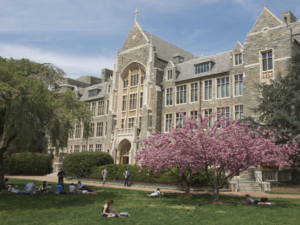In 1838, Jesuit priests sold 272 slaves to pay off Georgetown University’s debts. Now, the descendants of those slaves will have an advantage getting into the school — the same advantage legacy students receive, President John J. DeGioia has announced.
In Georgetown’s early history, the university was supported by Maryland plantations. The plantations, on which hundreds were enslaved, were owned by university-affiliated Jesuit priests.
Though it was not the only slave sale made to support Georgetown, the 1838 sale of 272 men, women, and children was the biggest, and therefore the most controversial, even at the time. The slaves were sold to Louisiana plantations for $115,000, which is $3.3 million today when adjusted for inflation.
In a letter to the university community, DeGioia outlined several steps that Georgetown will take to atone for its ties to slavery. Besides offering an admissions advantage to the descendants of any Georgetown-affiliated slaves — not just the descendants of the 272 — the university has established an Institute for the Study of Slavery and Its Legacies, and has re-named two buildings formerly named for the two university presidents who organized the sale to fund the school. Isaac Hall will be named after one of the men who was sold, and Anne Marie Becraft Hall will be named after a black educator.
“I believe the most appropriate ways for us to redress the participation of our predecessors in the institution of slavery is to address the manifestations of the legacy of slavery in our time,” DeGioia wrote in his letter.
RECONCILIATION BEGAN WITH MULLEDY HALL
Georgetown’s move is unprecedented, according the New York Times. Efforts to reconcile with the past began a year ago. In August 2015, DeGioia addressed the school community to announce the reopening of Mulledy Hall as a residential building. Mulledy Hall, originally named for university president Rev. Thomas F. Mulledy, is one of the buildings that has been renamed.
“Though Fr. Mulledy contributed much to our University, his actions represent a difficult past that is contrary to the values and mission of our University — a mission that we affirm and seek to strengthen in our examination of this history and its impact on our current moment,” DeGioia wrote.
DeGioia said the reopening of the building was an occasion to reflect on the history of the school, and in honor of the enslaved people who were sold, he convened the Working Group on Slavery, Memory, and Reconciliation. The group’s mandate: to explore the university’s history of slavery and guide future reconciliation efforts. The steps outlined in DeGioia’s more recent letter are based off its recommendations.
SLAVERY AT GEORGETOWN
The group’s report, submitted to DeGioia this summer, found that the university was more dependent on slavery than previously thought. Slave labor and sales were included in Georgetown’s original financial model, and slaves were forced to work both on Jesuit plantations and on campus.
Wealthy students also brought their own slaves, and according to archival materials, the use of rental slaves on campus was common. In the early 1800s, about 10% of the Georgetown population was enslaved, according to the report, which also found that all of the oldest buildings on campus, including the buildings now renamed Issac Hall and Anne Marie Becraft Hall, were likely built by slave labor.
STILL FURTHER TO GO
In his letter, DeGioia wrote that the steps Georgetown is now taking are only the beginning. “This moment is an opening, a beginning, an invitation for us — and each of us is welcomed to engage, to offer perspectives, to reflect, and to understand anew the responsibilities that we have to one another,” he wrote.
However, as the Times reported, some descendants of the 272 have expressed disappointment with the university’s new measures. Karran Harper Royal told the Times that Georgetown should have offered scholarships to descendants, and that she and others were not formally invited to DeGioia’s speech.
“It has to go much farther,” she said. “They’re calling us family. Well, I’m from New Orleans and when we have a gathering, family’s invited.”












Questions about this article? Email us or leave a comment below.